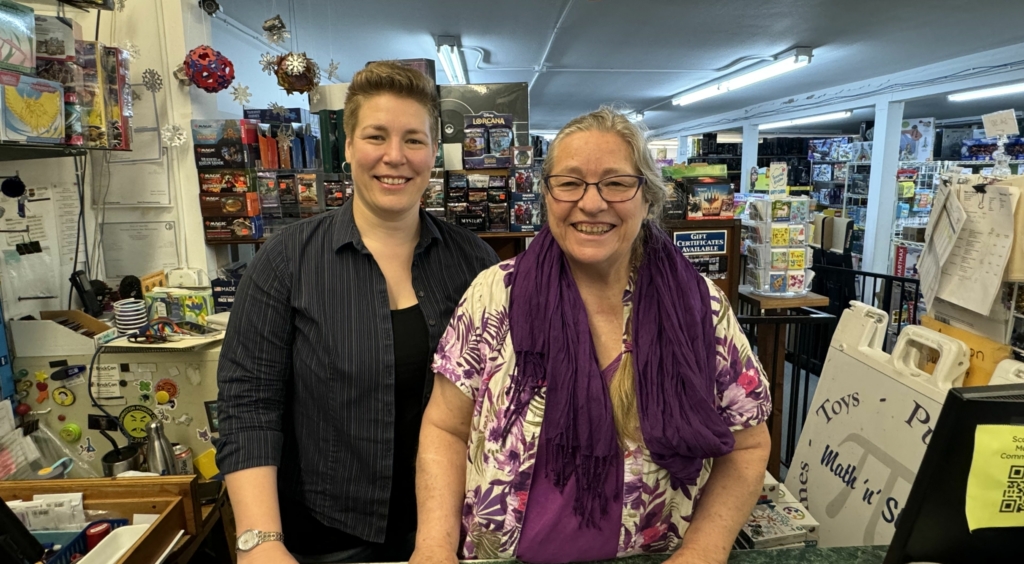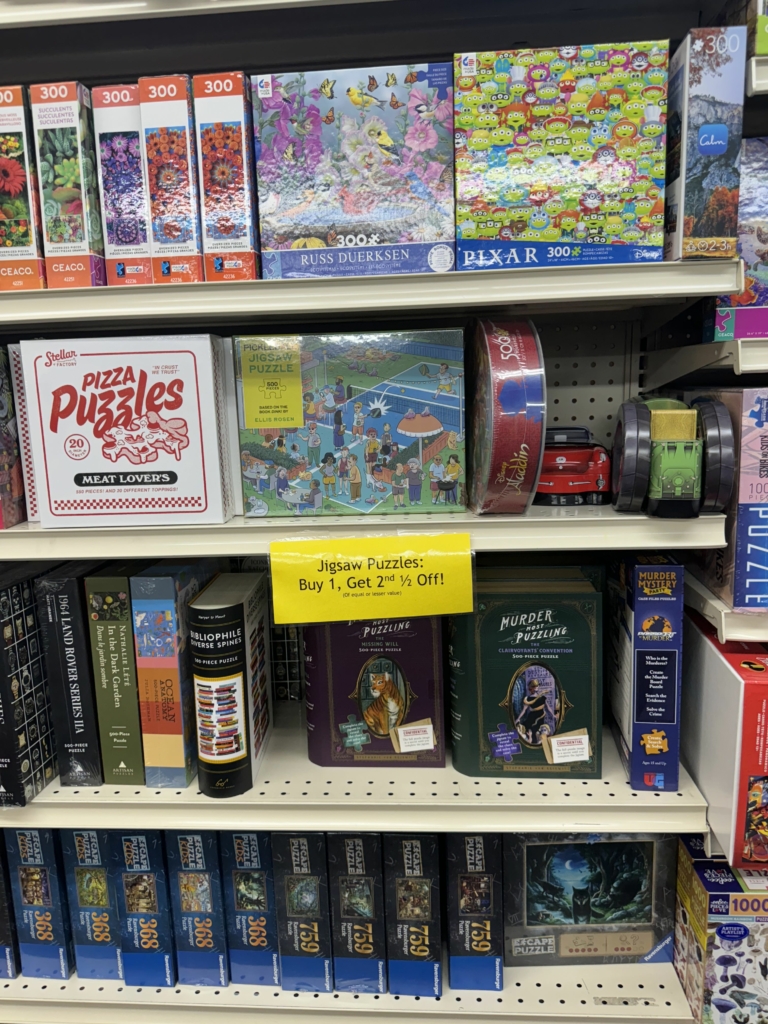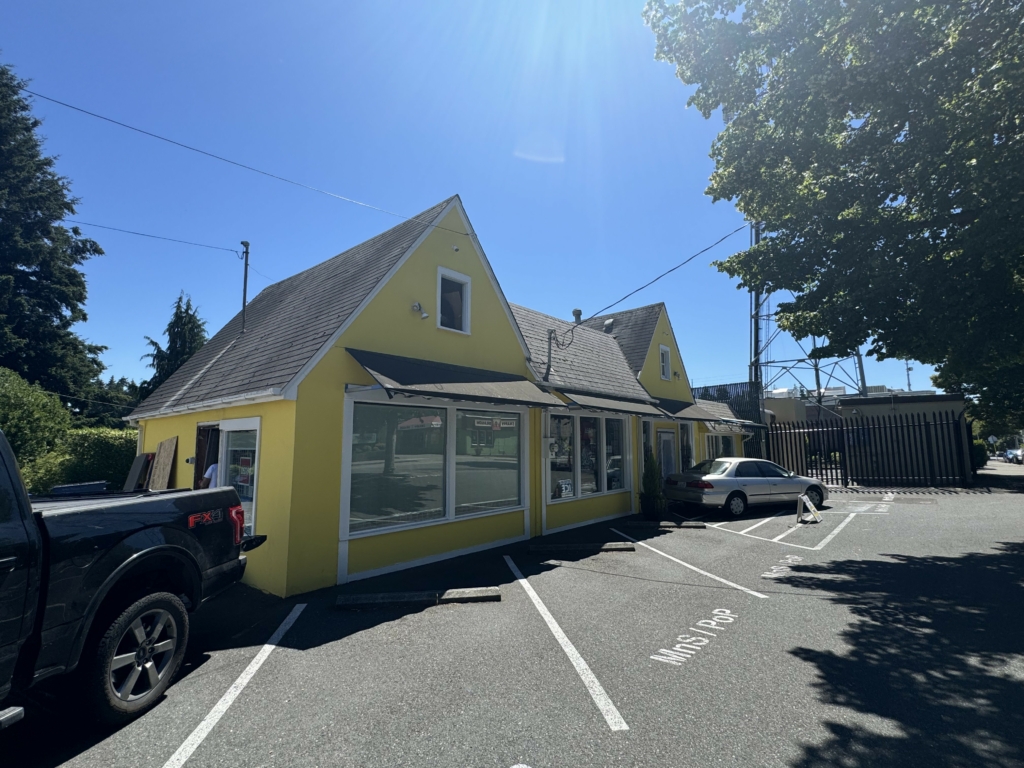
In an era of ever-changing educational trends and a boom in board games and puzzles, Math ‘n’ Stuff has remained a steadfast resource for families and educators. Since 1993, this Maple Leaf store has curated a unique selection of math resources, brain teasers, and engaging games that make learning fun.
In this week’s Small Business Spotlight, we talk to Gini Wingard-Phillips and her daughter Mikaela Wingard-Phillips about how they’ve navigated shifts in math curriculum and the explosion of play-based learning options. They share insights into their product selection process, and how they’re adapting to changes in the education market. Through their story, we gain a behind-the-scenes look at what it takes to remain a beloved educational store for over 30 years.
Tell us about Math ‘n’ stuff and how it started.
Gini: So Math ‘n’ Stuff was an accident. I was practicing law and homeschooling six children, and someone suggested that I teach a workshop at the homeschooling convention, and I wanted to do something that was unique, so I settled on teaching kids logic and how to think well.
Because the convention attendees came from all over the state, and some from Canada, Oregon, and Idaho, and places where there was no availability of teaching stores. I realized I better have some stuff for them to have, take home, and use, so I asked my friend to stock some books in her booth. One thing led to another, and I transitioned from playing divorce warrior as an attorney to building a store and being a teacher. It was life-giving instead of soul-draining.
We started in June of 1993, and by Thanksgiving of 1994, we were driving around and found a little place at 55th and Roosevelt, across from Taste of India. We were open 3 days a week and I was still practicing law – my last trial was in the Fall of 1996.
Nobody thought when I started that a mathematics store could survive. They said it’s too unpopular, it’s too narrow. And whatever you do, don’t put the word math in it. And I went, no, no, and hell no.
Amazingly, even to me, we have survived for over 30 years now. We outgrew the little building down at 55th and ended up being open seven days a week. We moved to Maple Leaf in the fall of 1996 and ended up being able to buy the building in 2008 so that we could be secure.
Last summer, Mikaela threw a great big party for our anniversary. I came and met one of the young fathers who had his young son with him who told me that he remembered shopping here with his parents when he was a little boy. The tears started just running down my face – the fact that we impacted multiple generations!
I wish Math ‘n’ Stuff had been available when I was younger because I’m having flashbacks to being in the “lower” math group.
Gini: I call myself a math evangelist. I preach the love of mathematics and healing from math wounds, often caused by teachers who didn’t like math themselves. This turns students away and passes on math anxiety. The former head of math for Washington state, told me 80% of K-5 teachers are math-phobic – and that’s a low estimate. That means four out of five years, students learn math from teachers who fear it, creating a cycle of anxiety.
Mikaela: This happened to me with reading and writing due to my ADHD and family of avid readers. But I’ve worked hard… If math evangelists focused on love and healing, it would be a more peaceful world. I went to graduate school to teach math because I knew it didn’t have to be painful. After graduate school didn’t work out, I joined the store in 2012. Now, I want to own it and keep it going for another 30 years. I want my kids to grow up with Math ‘n’ Stuff in Seattle.
I’m a play evangelist. Play releases dopamine, oxytocin, serotonin, endorphins – a daily dose of play is vital. Play helps with human connection, counters isolation, aids learning, promotes joy. It’s needed now more than ever for connection and innovative learning.
How has the math curriculum evolved over the years?
Gini: Surviving over 30 years, we’ve seen various curriculum wars and different approaches to math teaching.
I’ve tried to stay more or less neutral, although I believe that it’s important to have a playful way to learn. At one point, they asked me to give a seminar at the State Math Conference on integrating games and puzzles into math curriculum.
We’ve had people who retire and they bring us all their math goodies. We’ve had a lot of support from the community.
Mikaela: But there’s also the turnover in leadership. In 2008, during the recession, a lot of the school district purchasing went to district warehouses. Teachers no longer had $300- $500 in discretionary spending, and a reimbursement each year that they could use to come and pick games or other learning materials for their classroom,
That’s really changed our business, because that the teachers didn’t have that money to spend, our business really shifted to working with families. The families became our primary audience instead of the educational market.
In some ways, that’s good. In others, it’s really hard, because it’s really inequitable. The families who can afford to shop here do, and the families who don’t, don’t. There are geographic barriers and there’s economic barriers. It hurts that we’re only able to serve the most affluent Seattleites.
We’re doing work to help provide scholarships to our play-based enrichment programs. We run Magic the Gathering and Pokemon play-based enrichment, we’re hoping to offer Dungeons and Dragons and other strategy games in the future. We also have summer camps. Part of the work that we’re doing is to grow the scholarship fund to help students attend who wouldn’t otherwise be able to afford it.

How has your store’s product selection changed over the years?
Mikaela: Oh, heavens. Well, so there are, there are cycles. For example, a lot of parents who are my age (I’m 40), have brought back the toys of our childhood like the Spirograph and a lot of Fisher-Price. There are a lot of nostalgia toys.
There’s been a massive board game boom in the last 10-15 years. We grew up playing Milton Bradley, Parker Brothers, Sorry, Monopoly, Payday, Guess Who – this is what’s thought of as the classics. But now, Catan is a classic, Ticket to Ride is a classic. These things have been out for 20, 10, 15, 20 years.
We’re kind of in a golden era of board gaming, which is like a double-edged sword because there’s 4,000 new games a year, and no one can keep up. The publishers can’t keep up, the retailers can’t keep up, the customers can’t keep up. At some point, the board game bubble will burst. But we do our very best to cultivate a selection, which is maybe 1% or less of those 4,000 games a year to make sure that, you know, they’re the games that are the most accessible.
It can’t just be a good game anymore. It has to be a great game. And it has to find an audience.
Gini: We became a Lego account maybe 20 years ago. In the beginning, my husband said, “no LEGO! Everybody sells them.” And I’m going, “They’re wonderful!” But he didn’t like stepping on them, he didn’t want me to have them for the kids. And I’m going, “a child without small pieces is a deprived child.”
Lego is our biggest line. It’s in the back – it’s a 50 foot section of our store. So Lego, board games, we still, I think we’re the last educational store. So math and stuff will never go away.
Mikaela: We’re the last educational store in the state besides Launching Success in Bellingham.
The past two years have been challenging for teachers, who haven’t been able to easily assess their students’ knowledge to guide them. They couldn’t recommend resources like Math and Stuff to help with specific areas like fractions or multiplication. Unfortunately, this part of our business has suffered.
A customer recently came in looking for a game with math in it. I jokingly said, “Every game has math in it!” They weren’t impressed. I clarified, showing them our arithmetic games.
But we still have a vast selection of spatial reasoning, logical, and sequential puzzles that are core to who we are. The topology puzzles you twist and turn – those are a big part of our offering.
Gini: Jigsaw puzzles are also a huge section of our store. Which is relaxing, actually.
Mikaela: During the pandemic, they went crazy. We have a 30 foot jigsaw section. We have several hundred jigsaws available at any given time.
They’re relaxing and creative. Jigsaws, unlike maybe some of the other brain teasers, you use both sides of your brain, which is really cool. You’re using both the analytical and the artistic side of your brain. It’s a lot of visual perception and noticing small differences, which is really important for future scientists to be very, very observant.
They’re always Buy One, Get One half off because Gini wants people to have puzzles. Well, and Gini loves to order them. Since the pandemic, we have a monthly puzzle swap for the community to come and trade puzzles.
We figured out how to have a board game rental section so that people could try out games before owning them. So many times, you know, similar to the grocery store, there are aspirational purchases.

Let’s talk about some of the challenges you’re experiencing as small business owners.
Mikaela: Since 2020, there has been a very sharp increase in organized retail crime. And unfortunately, we’ve been targeted for items like Magic the Gathering, Pokemon, and Lego, because it’s easy.
The city hasn’t done enough. The country hasn’t done enough.
You know, we’re globalized, we have the internet. It’s really the people at the top of the pyramid, who are driving crime at the lowest level in the city. The police can’t keep up, the small businesses can’t keep up.
We’re looking at about $30,000 in repairs from two attempted burglaries within the past five weeks. The personal mental health work that I’m doing to overcome that, losing sleep,, being a toddler parent, and, wearing all the hats – that’s what small business owners have to do. Those are the most challenging parts, but it’s really a labor of love.
I get vicarious joy from helping customers gift to each other. There’s a fun neurochemistry fact – when you give an act of kindness, your body releases neurochemicals.
When you receive an act of kindness, your body releases positive neurochemicals.
And when you witness an act of kindness, your body releases positive neurochemicals.
I spend a lot of my time when I can be in the front of the store on a neurochemical high, because I love helping people find things that bring them joy and/or that will bring the people they love joy.
Gini: That brings back a beautiful memory from a Christmas Eve, probably from 20 years ago. It was an hour before closing and the young father came into the store. And he says, “I’ve looked everywhere, my son really wants this one specific thing and I don’t know what it’s called.”
And my heart just clenched. I thought, “How am I gonna find this?”
He said that “it sort of twists and turns and has pretty stuff inside….” and Irealized that I might know what it was, and took him over the display. And I went, oh, I think I might know what you want. And I took him over to the display and his eyes lit up and he said, “this is it!”.
But every time this memory comes back to me, I get emotional. It was huge. First, there was the fear that I was going to let him down, and thereby, let the son down. And it was a matter of love, a proof of love from the father to the son. And I found it and the father left relieved and happy.
Being able to join the right person with the exact right thing they are looking for is a gift.
What should somebody expect when they come into the store? What’s the experience that they’ll have?
Mikaela: Just like the Tardis, we’re bigger on the inside. Because we’re repairing our doors, you have to come through the back.
Part of the reveal of our store is that someone walks in knowing our name, Math ‘n’ Stuff, and discovering there’s so much more – to their delight. To find something that you connect with, regardless of your age or gender identity or passion in life, regardless of what your play looks like. There is always something that you can find in our store that brings joy.
How can the community support Math ‘n’ Stuff after the break-ins?
It’s so frustrating that tragedy is the thing that reminds people that we’re here. Support is for us right now is three different things.
- Social support – shout us out on the internet, tag us in a post, leave us a kind review.
- Financial support – you can come and shop, you can donate to our scholarship fund. If you want to throw money at our repair fund, it’s on GoFundMe.
- Political support – This type of crime isn’t going to change until we take systemic action. We’re hoping that our community will write to city officials, state representatives, and the governor and say: these are the things that need action and they need action now. And we need to start working on them. They’re not going to go away right away. If we don’t start, it’s just going to get worse and will keep happening to the stores and restaurants that we love.
And also just stopping by to say hi is really huge for us!

1 response to “Business Spotlight: Math ‘n’ Stuff”